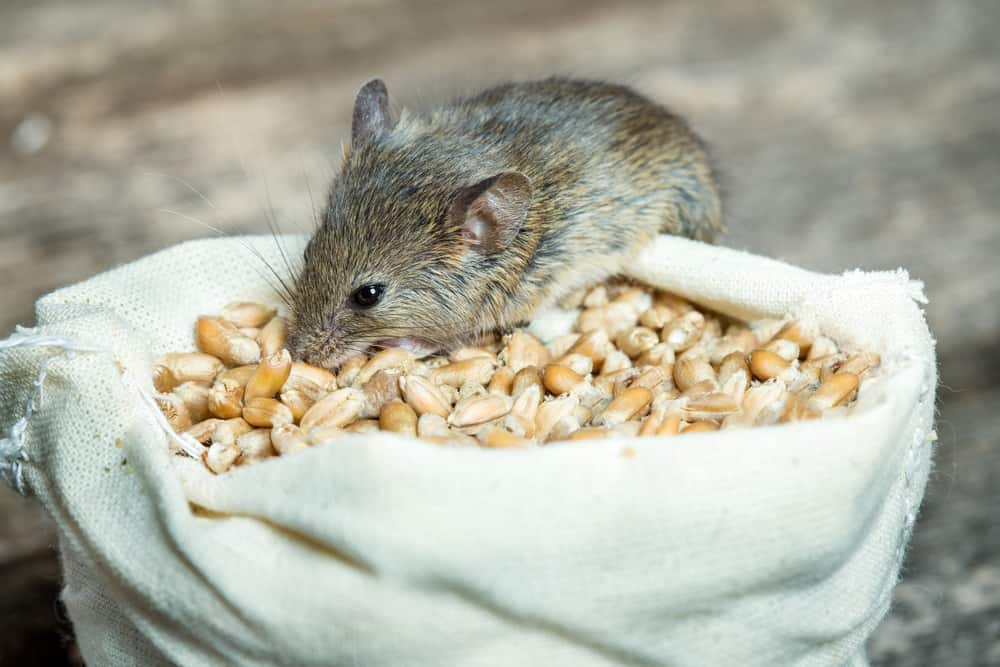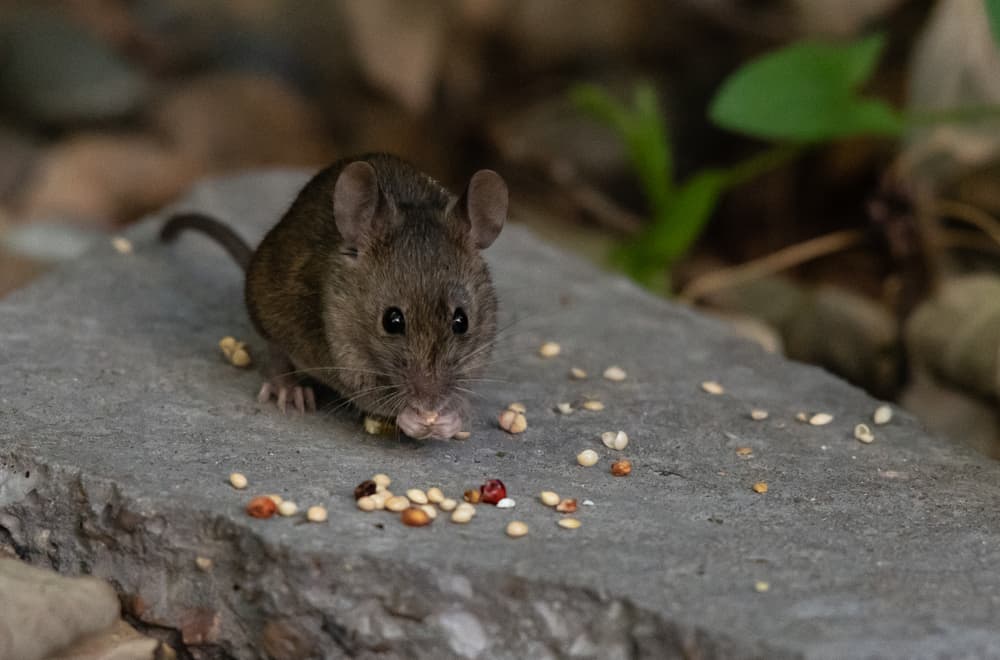They’ll chew on your clothes, dig through your garbage, and bite through anything else they can get their teeth on. Yes. Mice may be adorable, but they are also disease-carrying pests.
Besides cheese, these insatiable rodents eat practically everything you can eat and more. So, let’s find out in detail “what do mice eat?”
What Do Mice Like To Eat?
Being omnivores, mice consume both animal and plant matter. But the common house mice will eat almost everything.
Mice are greedy mammals, and they can eat all day. They feed about 15 to 20 times a day and build their homes near places where food is abundant and readily available.
They have tendencies to gnaw on uneatable material such as paper, cardboard boxes, and electric wires, among other household items. This destructive behavior is a result of their nesting habits. They make use of the material they find to build nests where they rest and breed.
Contrary to popular belief, mice don’t like to eat cheese that much. With that said, let’s have a look at what mice eat:
- Stems –juicy stems of plants provide moisture to keep mice hydrated and provide energy for mice to keep them energetic throughout the day.
- Shoots –such as garlic, asparagus, and rhubarb- provide mice with energy, carbohydrates, and proteins to meet their daily nutritional needs.
- Leaves –are rich in protein.
- Grass –provides vitamins and minerals for mice, such as vitamin C, E, magnesium, and iron.
- Cereals –for example, oats, corn, wheat, barley, rye, etc.
- Seeds– examples include sunflower seeds, pumpkin seeds, flax seeds.
- Tree bark –mice chew on tree bark to get to the softer part of the tree, known as cambium. They consider it a delicacy, and it helps in regulating the size of their ever-growing teeth.
- Roots –mice will feed on roots of plants such as tomatoes, yams, and cassava to fulfill different nutritional needs.
- Mushrooms
- Snails and slugs –are rich in protein and therefore beneficial to their diets.
- Centipedes –mice tend to hunt much smaller animals to fulfill their dietary needs.
- Larvae (offspring of insects) –provide a ready meal for mice and are rich in protein and other nutrients.
- Worms.
- Crickets.
- Beetles.
- Butterflies.
- Caterpillars.
- Grasshoppers.
- Millipedes.
When food is rare to find, other mice will turn on their species as a source of nutrients to keep them going.
The Harm Of Mice
Mice may look adorable to some people, but these critters cause a lot of damage and pose medical threats to your family and yourself.
The danger mice cause is a result of their chewing tendencies. Mice chew to maintain the size of their teeth. They’ll chew anything from plastic pipes to dry walls, aluminum, insulation, or gas or wire lines. Openings caused by chewing on walls may not be a threat to you or your family
When mice chew through wires, leaving them exposed, the chances of a fire starting are high. Also, when mice chew through gas pipes, the chances of carbon monoxide poisoning is high due to gas leaking.
Mice can cause several serious health issues if not dealt with promptly. House mice are usually not considered a threat, but they too can pass diseases through their urine and feces. Some health complications that may arise as a result of mice infestations include:
- Salmonella –is a bacteria mice carry. As they run around the kitchen searching for food, they contaminate kitchen surfaces and food left out by touching and biting; hence spreading the bacteria. Symptoms experienced when you eat food exposed to the bacteria is similar to that of food poisoning.
- Hantavirus –is mainly associated with deer mice. Their urine and poop carry the virus. The dust formed when the rodent’s urine dries is toxic to human health. Fresh urine and poop are also as harmful as dust. The disease kicks off with fevers and chills, and if not treated immediately, it can lead to a severe condition that can lead to death.
- Lymphocytic Choriomeningitis (LCMV) – If you get exposed to fresh urine, saliva, droppings, or other nesting materials where mice have been, you might contract LCMV. This virus causes your brain to swell. In the long run, it may lead to deafness or even arthritis.
You should practice regular and continuous cleaning to help prevent the spread of these diseases caused by mice. Use soaps and detergents to ensure objects and surfaces are well cleaned.
Tips To Get Rid Of Mice
Make your homestead less appealing to mice. Ensure you store your grains and cereals in well-sealed containers. Perishable goods such as fruits and veggies should be kept in the refrigerator. Lastly, you should make sure to clean up up any messes left after having your meals. Throw trash in the garbage can and ensure the lid is on tight.
- The simplest way to rid your house of mice is to get a cat. Cats love hunting mice, and many people use this method to keep their houses rodent-free. Many farmers make use of barn cats to control their mice populations. An alternative would be to buy cat litter and sprinkle it in the areas most frequented by the mice. The cat litter will serve as a deterrent.
- Among the best ways to rid your house of mice during an infestation is using mouse traps. Use a variety of mouse traps such as the wooden snap traps, bit traps, glue traps, and multiple-capture live traps. This strategy gives you better chances of catching most of the mice, if not all, during an infestation.
- Cover or eliminate entry points mice might fit through. These rodents can fit through very tiny spaces. You should seal any opening or cracks around your homestead. Inspect your home area and repair any broken windows, faulty doors, and cover any open spaces. It would help if you did this before winter when mice seek shelter indoors.
- Eliminate or trim bushes around your house. Shrubbery is attractive to insects and rodents. They use the brushes to hide from plain sight and make their way indoors. Also, keep stacks of firewood away from your house as mice like to nest in these piles.
- Use essential oils to discourage mice from taking shelter in your home. The smells of olive and peppermint oils are said to repel mice. Make cotton balls and soak them in this liquid. Afterward, place the soaked cotton balls on entry points of the mice, such as drawers and cabinets.
- Make use of a dehumidifier. Get it at your local supermarket. A dehumidifier lessens and maintains levels of humidity in the air. It helps keep potential mice nesting areas such as attics, garages, crawl spaces, and basements ventilated.
- Use humane traps. These traps don’t harm mice in any way. You should place them in places the rodents frequent and check them every morning. Lure them in with bait such as buttered popcorn. Release the mice you capture at least a kilometer away from your home.
- Make use of anticoagulant rodenticides. Anticoagulant means blood-thinner, and rodenticide means rodent killer. These are poisons used to kill mice by thinning their blood. After several days of feeding on the poison, the mice die. Mix the poisons with bait such as peanut butter or chocolate.
- When you identify entry points used by mice to enter your home, for example, underneath your sink, cover them using duct tape. This method will help in keeping the mice at bay before you find a permanent solution.
- Lastly, you can fill small openings or cracks on your walls with steel wool. Chewing through steel wool is unpleasant to mice. Hence, this method will act as a deterrent to mice trying to invade your home.
The above methods are a few ideas you could try to keep mice away or rid your homestead of an infestation. Ultimately, if the infestation is too much for you to handle, call the professionals!
Frequently Asked Questions (FAQs)
Do mice hate aluminum foil?
Yes. Mice dislike aluminum foil. In place of steel wool for blocking entry paths for mice, you can also use aluminum foil or other metals. The reason behind this is because cause mice can’t bite through most metals.
Can you vacuum mouse poop?
When cleaning up mice droppings and urine, there are preventive measures you should take to avoid contracting the hantavirus. Such measures include: wearing latex gloves when cleaning the waste, using disinfectants, etc.
You should NEVER vacuum or sweep mice poop, urine, dead mouse, or nesting. Doing so can create dust that, when inhaled you might contract the hantavirus.
Can mice swim up the toilet?
Mice are known to be excellent swimmers, capable of swimming and treading water for upto three days. In addition, they can hold their breaths when fully submerged for a three-minute average time. Therefore, if you flash a mouse down the toilet, don’t be shocked to see it again.
Summary
Mice may be very small mammals, but they can cause really big problems. When cleaning mice droppings and urine, avoid direct contact. Mice can spread several diseases and viruses that can be fatal to human beings.
Practice proper hygiene and sanitation in your home to discourage mice and other rodents from taking shelter in your home.


Informative article.
Gefilte Fish and Matzah Ball Soup, is more food that you can lure to eliminate the most subversive of vermin.
I have mice nesting in a storage bin next to my house. I’m wondering if I get rid of the storage bin willbthey Look for a place inside my house
Also last year about this time the mice attracted a copperhead so that concerns me
Check on the “live trapping and releasing a kilometer away” method’s legality in your area before you do that. I was on board with it and then a neighbor told me in our state it is totally illegal to live trap any animal for release. I verified with wildlife control. Reason being that in the release location they have no home, no defense, no way to locate water and food for themselves fast enough before that or something else is likely to kill them. You’re basically just dooming them, but too chicken to do the deed yourself.